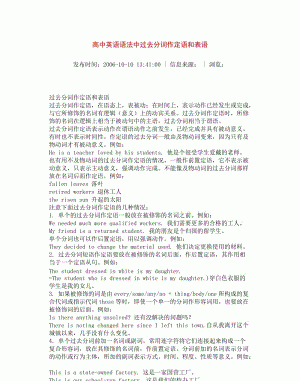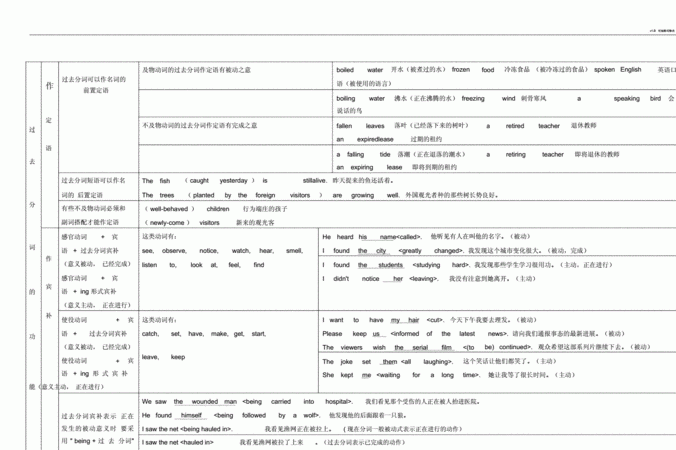本文目录
过去分词作定语时的用法翻译
前置相当于形容词。
后置相当于定语从句。
1、前置定语
单个的过去分词作定语,通常放在被修饰的名词之前,相当于形容词,表示被动和完成意义。
A类:被动意义:
an honored guest 一位受尊敬的客人
The injured workers are now being taken good care of in the hospital.
受伤的工人现正在医院受到良好的照料。
B类:完成意义:
a retired teacher 一位退休的教师
They are cleaning the fallen leaves in the yard.
他们正在打扫院子里的落叶。
2、后置定语
过去分词短语作定语时,通常放在被修饰的名词之后,它的作用相当于一个定语从句。如:
his will be the best novel of its kind ever written (=that has ever been written).
这将是这类小说中写得最好的.
Who were the so-called guests invited (=who had been invited) to your party last night?
昨晚被邀请参加你的晚会的那些所谓的客人是谁呀?

过去分词作定语的列举
过去分词做定语时,定语前置与后置应该这样区分:
1、单个的过去分词作定语,原则上应放在被修饰的名词之前。如:
She is a trained nurse. 她是一个受过训练的护士。
His troubled look frightened her. 他苦恼的表情使她惊恐。
Interested members will meet at two. 感兴趣的会员两点钟碰头。
Her job was to take care of the wounded soldier. 她的工作就是照料这个伤员。
2. 单个的过去分词作定语,有时习惯上要放在被修饰的名词之后(此时的过去分词通常是强调动作而非其性质或特征)。如:
我拿到了剩下的唯一的一张票。
误:I got the only left ticket.
正:I got the only ticket left. (left = that was left)
我们未能就所讨论的任何问题达成协议。
误:We couldn't agree on any of the discussed problems.
正:We couldn't agree on any of the problems discussed. (discussed = that were discussed)
被问及的人发表了很不一样的看法。
误:The questioned people gave very different opinions.
正:The people questioned gave very different opinions. (questiOned= who were questioned)
被调查的人大都支持首相的决定。
误:The majority of polled people supported the Prime Minister's decision.
正:The majority of people polled supported the Prime Minister's decision. (polled = who were polled)
3. 过去分词修饰those时,通常要后置,表示“有关的那些人”的意思。如:
Most of those questioned refused to answer. 被问及的那些人多数都拒绝回答问题。
Those selected will begin training on Monday. 被选上了的那些人将于星期一开始训练。
The authorities say they've now released all those detained. 当局说,他们现已释放了所有被拘留的人。
90% of those questioned felt uneasy about nuclear power. 百分之九十的被调查者都对核能感到忧虑。
Of those polled,seven out of ten said they preferred brown bread. 那些被调查者十人中有七人说他们比较爱吃黑面包。
More than 30 of those arrested were released from jail for lack of evidence. 因证据不足,被捕的人中有30多人从看守所里放了出来。

动词的什么形式可以作定语
过去分词做定语
spoken English英语口语 written exercises笔头练习 polluted rivers被污染的河流 lighted candle点燃着的蜡烛
-ing形式做定语,可表示被修饰语的用途,也可表示被修饰语的特征。
reading room阅览室 swimming pool游泳池 printing shop印刷厂 an interesting story有趣的故事
▲联系动词be等的过去分词不能做定语。 Those who are ill don’t go to see the film.
▲不及物动词的过去分词不能做定语. The man who died in the accident yesterday was a robber.
▲少数不及物动词的过去分词如fallen,boiled等可作前置定语:fallen leaves(落叶),boiled water(开过的水).;
arrive, return等不及物动词的过去分词前有副词修饰时,可作后置定语: The train just now arrived in Beijing is from Hong Kong.
▲连系动词be等或状态动词的-ing形式不能做定语。
例:那些生病的人不要去看电影。
【误】Those being ill don’t go to see the film.

过去分词作定语的例子
过去分词作定语有前置和后置两种情况。
1、前置定语
单个的过去分词作定语,通常放在被修饰的名词之前,表示被动和完成意义。
A类:被动意义:
an honored guest 一位受尊敬的客人
The injured workers are now being taken good care of in the hospital.
受伤的工人现正在医院受到良好的照料。
B类:完成意义:
a retired teacher 一位退休的教师
They are cleaning the fallen leaves in the yard.
他们正在打扫院子里的落叶。
2、后置定语
过去分词短语作定语时,通常放在被修饰的名词之后,它的作用相当于一个定语从句。如:
This will be the best novel of its kind ever written (=that has ever been written).
这将是这类小说中写得最好的。
Who were the so-called guests invited (=who had been invited) to your party last night?
昨晚被邀请参加你的晚会的那些所谓的客人是谁呀?
过去分词作表语
作表语的过去分词主要来自及物动词,在主-系-表句型中,说明主语所处的一种状态。其中系动词有包括be在内的多种形式。如:
You seem frightened.
你看样子受了惊吓。
少数不及物动词(如go, come, set)的过去分词也能作表语,但它们不表示被动意义,只是表示动作完成。如:
They are gone for vacation.
他们度假去了。
注意:要区别“系动词+过去分词(系表结构)” 和 “系动词+过去分词(被动语态)”。如:
A. The library is now closed.
图书馆现在关门了。
B. The library is closed at six.
图书馆经常在六点钟关门。
说明:作表语用的过去分词表示主语的特点或所处的状态,强调主谓关系。这种结构中的过去分词前可加quite, very, rather等修饰词。系动词可有多种,表示不同的意义;被动语态表示动作,强调动宾关系,绝大多数被动结构中的行为执行者还可以用by短语来表示。因此,我们不难看出在上面两句中,A句是系表结构,B句是被动语态。

以上就是关于哪些过去分词不能作前置定语 ,过去分词作定语时的用法翻译的全部内容,以及哪些过去分词不能作前置定语 的相关内容,希望能够帮到您。

